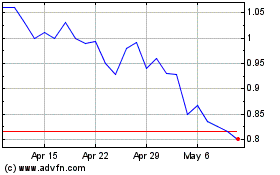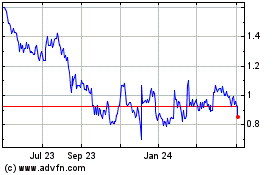CEA|CNET ''Tech First Panel'' Reveals Habits of Technology Early Adopters and Insight on Future of Consumer Electronics Market
October 03 2005 - 3:39PM
Business Wire
Premiere Research Study Finds Broadband Internet Connection and
Home Networking Are Critical Components of the Digital Home The
digital home of the technology early adopter is a place where the
Internet connection is almost as important as the water connection,
concluded the Consumer Electronics Association (CEA) and CNET
(www.cnet.com) based on a new Digital Home consumer research study.
CNET, the trusted resource dedicated to helping consumers buy and
use personal technology and a property of CNET Networks Inc.
(Nasdaq:CNET), and CEA, the preeminent trade association promoting
growth in the consumer technology industry, formed a research
partnership last year to gain insights into the future of many
consumer electronics technologies. Now, the two organizations have
formed a new panel called the CEA|CNET Tech First Panel to reveal
the habits of early technology adopters. The premiere CEA|CNET Tech
First Panel study focused on the digital home. The study was
administered via the Internet to an online sample of CNET users who
were screened as people who adopt consumer electronics products in
the early to mid-product life cycle stages. The panel sheds light
on the demographics and preferences of early adopters, in this case
their insights on the digital home. "Through the CEA|CNET Tech
First Panel, we have access to early adopters - a critical industry
audience, because their interests and behaviors are often
precursors to future mass market trends," said CEA Director of
Research Joseph Bates. "In the Digital Home Study we found that
these consumers spent an average of $2,441 in the past year on
consumer electronics products, which is nearly two times the
national household average. We also found they are most likely to
purchase these products at general consumer electronics retailers -
the so-called big box stores. Nearly three-quarters of the group
surveyed had purchased a product at a major CE retailer in the past
12 months. Finally, respondents indicated they tend to install and
set-up products themselves." "We're extremely pleased that CNET is
able to provide the industry with the insights of the early adopter
population through the CEA|CNET Tech First Panel and to be working
with the CEA to do so. This panel is an important subset of CNET's
broader audience because their actions help us understand what may
lie ahead for general consumers," said Candice Meyers, senior vice
president of CNET. "This Digital Home Study gives us a blueprint of
sorts for the future of technology in the home." The premiere Tech
First Panel study delved deep into this key CE constituency's views
on the digital home, and found that they spend nearly two times the
national average on consumer electronics products and are
disproportionately male, younger and better-educated compared to
the overall population. As expected, the digital home demonstrates
elevated levels of technology ownership compared to the average
U.S. household, but while the digital home may have more CE
products than average, a handful of technologies comprise the real
framework of the digital home. The Digital Home Study also found
that early adopters do a lot of CE research and shopping online, as
well. Seventy-two percent responded that they had made a purchase
from an online merchant in the past year and some 5 percent said
they buy exclusively from online retailers. Virtually all (99
percent) of this group use the Internet to research new CE products
and 69 percent visit retail stores to investigate products in
person. Underscoring the need for product manufacturers to create
buzz around a new product launch, about half (48 percent) of early
tech adopters ask someone they know about the product. By
comparison, only 29 percent look to ad circulars for product info.
"For the digital home of today, a broadband Internet connection and
home network are critically important, serving as the foundation of
the digital home," continued Bates. "Within that house, we find
that computers, HDTVs and security and lighting controls are the
'bricks' for early adopters. In fact, among the respondents who do
not own the technology, HDTV and a home network scored the highest
for ownership interest, which demonstrates their importance to the
digital home." Seventy-three percent of early adopters operate a
home network, according to the Digital Home Study, and almost all
have a high-speed Internet connection. The network, which can be
wired or wireless in the early adopter household, does much more
than connect computers in the digital home. In fact, both the home
network and computers are used by early adopters for entertainment
purposes - the network is used to connect various audio and video
devices throughout the home and the computers in the digital home
are used to listen to music, play games and view digital pictures.
CEA|CNET Tech First panelists own on average two computers and 1.25
notebook PCs per household. The study also measured ownership and
interest in technologies such as lighting and HVAC controls and
home security systems. Results showed that digital home
technologies typically are clustered, so a house with a home
security system, for instance, is twice as likely to have automatic
exterior lighting controls or automatic sprinklers. Early adopters
expressed interest in future home technologies that can be built
into their digital domains, as well. Many study participants
indicated they would like to own products like self-cleaning
toilets, moisture sensing lawn sprinklers and dishwashers that put
away the dishes automatically. "As technology early adopters of
today continue to build-out the digital home, the industry needs to
stay informed," Bates concluded. "That's one of the objectives of
the CEA|CNET Tech First Panel research and we're looking forward to
studying future survey results." The CEA|CNET Tech First Panel:
Digital Home Study was designed and formulated by CEA Market
Research, the most comprehensive source of sales data, forecasts,
consumer research, international research and historical trends for
the consumer electronics industry. The study was completed in
September 2005. The complete study is available to CEA member
companies only. About CEA (www.CE.org) The Consumer Electronics
Association (CEA) is the preeminent trade association promoting
growth in the consumer technology industry through technology
policy, events, research, promotion and the fostering of business
and strategic relationships. CEA represents more than 2,000
corporate members involved in the design, development,
manufacturing, distribution and integration of audio, video, mobile
electronics, wireless and landline communications, information
technology, home networking, multimedia and accessory products, as
well as related services that are sold through consumer channels.
Combined, CEA's members account for more than $121 billion in
annual sales. CEA's resources are available online at www.CE.org,
the definitive source for information about the consumer
electronics industry. CEA also sponsors and manages the
International CES - Defining Tomorrow's Technology. All profits
from CES are reinvested into industry services, including technical
training and education, industry promotion, engineering standards
development, market research and legislative advocacy. About CNET
(www.cnet.com) CNET (www.cnet.com), a property of CNET Networks,
Inc., is dedicated to helping people buy and use personal
technology to enhance and enrich their lives. CNET's award winning
editorial staff reviews thousands of products each year, providing
expert and unbiased advice on what products to buy. The site also
offers help and how-to features enhanced with video content that
visually shows consumers how to get the most out of technology once
they own it. And, with an extensive directory of more than 400,000
products and price comparisons, CNET also gives consumers the most
up-to-date and efficient shopping resource on the Web. About CNET
Networks (www.cnetworks.com) CNET Networks, Inc. is a worldwide
media company and creator of content environments for the
interactive age. CNET Networks takes pride in being "a different
kind of media company," creating richer, deeper interactive
experiences by combining the wisdom and passion of users, marketers
and its own expert editors. CNET Networks' leading brands -- such
as CNET, GameSpot, MP3.com, Webshots, and ZDNet -- focus on the
personal technology, entertainment, and business technology
categories. The company has a strong presence in the US, Asia and
Europe.
ZW Data Action Technolog... (NASDAQ:CNET)
Historical Stock Chart
From Jun 2024 to Jul 2024

ZW Data Action Technolog... (NASDAQ:CNET)
Historical Stock Chart
From Jul 2023 to Jul 2024
